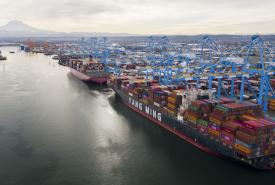The US Federal Maritime Commission (FMC) is currently working on an order that would see its staff demanding data and information from global shipping lines in a bid to resolve the effects of congestion seen along the US West Coast (USWC), according to the Journal of Commerce.
The USWC has seen minor levels of congestions for many years but the issue was made worse by the introduction of mega-ships. This was further exacerbated by the recent labour strikes that saw a number of USWC ports shut down and their operations put on hold.
It was reported that Richard Lidinsky and William Doyle, both commissioners with the FMC, accused container lines of charging congestion-related fees for the larger mega-ships they had brought to many US ports.
Closer collaboration between ports and shipping lines may be the answer for increased productivity and for reducing congestion, with solutions such as vessel-stowage planning available to enhance decision-making and to encourage ports and container shipping companies to make better decisions together.
However, concerns still abound due to issues relating to how fast ports can recover from the massive backlog of containers as a result of shutdowns.
To read Zepol’s Top 20 US Port Report, click here
‘Big Data’ is also becoming a potential panacea for ports to actively use data for better all round performance.
US Congress is also pushing for a database of port performance metrics which is being backed by supply chain stakeholders. Overall this is part of a larger policy to attain as much data as possible in order to deal with potential congestion more effectively.
(Source: iStock)









